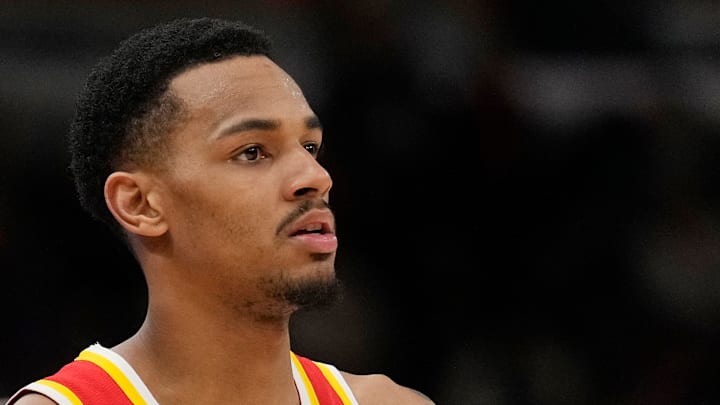The Atlanta Hawks are already feeling the sting of their trade for Dejounte Murray during the 2022 offseason.
They have yet to see any sustained version of the dynamic backcourt they envisioned when they acquired Murray from the San Antonio Spurs. They have been a Play-In Tournament team both years and missed the playoffs this year.
General Manager Landry Fields was brutally honest about his star backcourt.
“Sample size is getting larger and larger and larger,” Fields told reporters in February. “I can't lie to you, the numbers speak for themselves on that.”
Fields has been careful not to tip his hand on plans for the Hawks backcourt, just as he has with the No. 1 overall pick. Whatever he wants to do with the roster, the trade for Murray – which played a key role in driving his predecessor out – will make his job more difficult.
The 2023 first-round pick (from the Charlotte Hornets) and $114 million contract extension he signed were just the beginning.
After this season, Atlanta does not control its first-round pick again until the 2028 season.
They sent first-round picks in 2025 and 2027 as well as a swap in 2026. League rules also prevent them from trading their 2028 first-round pick outright, meaning they might not be able to trade a pick until 2029. It also effectively takes tanking off the table until then.
That is a good reason to believe Fields when he said they had no plans to take a step back at the deadline.
It could also be telling for his plans this offseason.
Hawks heading into pivotal offseason
However, he will again have to deal with the reality of the Murray trade. Without draft picks, Fields may have to overpay from the cache of draft capital and player contracts that he has to make up the difference in a trade.
They have several pricey veterans aside from Murray and Young – Bogdan Bogdanovic, Clint Capela, and De’Andre Hunter – who are trade candidates.
But their availability underscores another adverse effect of the Murray trade: the cap crunch.
The Hawks are roughly $8 million below the luxury tax threshold, a number they will surely pass if they re-sign restricted free agent Saddiq Bey. They have only paid the luxury tax twice in franchise history.
They were among the first teams to pay, being assess the tax following the 2022-23 season when the tax first went into effect.
The Hawks also paid the smallest amount in tax history in 2012, per Dunc’d on Prime.
They have actively avoided the tax in recent years, trading Kevin Huerter and John Collins at least in part due to salary cap concerns. Their results on the court could justify the trades, though the returns have highlighted the financial aspect.
Trading Collins for a conditional second-round pick and an aging veteran in Rudy Guy, and then flipping Gay – and the return received from dealing him away – underscored that even further.
The Hawks’ $20.5 million exception from the Collins trade expires in just under two months.
Their decision on whether or not to use it could be telling about their true willingness to spend, which often goes hand-in-hand with winning in the NBA, so long as the mix of players is right. The Hawks have shown a willingness to spend.
How much further are they willing to go to move past the glass ceiling they’ve been under for the past few years?
